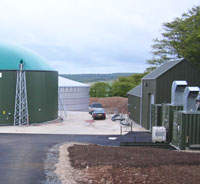ADAS scientist warns of looming phosphate shortage

A leading soil scientist believes that more than 50% of the UK’s total phosphate requirement could come from organic sources – saving the agricultural industry £20-30m a year.
Brian Chambers has urged the government to address a potential future shortage of phosphate by rolling out more anaerobic digestion (AD) plants.
Prof Chambers, of ADAS, has warned of devastating consequences to the world’s food supply if supplies of the fertiliser, which is crucial to agriculture, start to dwindle.
Digestate, the nutrient-rich substance produced by anaerobic digestion, contains high levels of phosphorus (P), potassium (K), and nitrogen, which improves soil fertility.
Western Europe imports all of its phosphate for agricultural use. But Prof Chambers believes the government could respond to the threat by recovering phosphate from organic waste that often ends up being sent to landfill – and processing it through AD plants instead.
“Our primary source of phosphate, rock phosphate, is imported into the UK for agricultural use and it is becoming increasingly expensive,” said Prof Chambers, head of ADAS’s soils and nutrients team.
“Supplies are expected to peak around 2030 and, unlike oil, there is no substitute for phosphorus. A shortage of phosphorus at the time when we need to be doubling our food supply could be disastrous.
“We need to make sure our food waste is recycled as much as possible, instead of just sending it to landfill. Anaerobic plants are the best way to do this.”
Prof Chambers said AD plants work similarly to a cow’s digestion system.
“Like a cow’s gut, the digester churns the plant matter over in its belly and ‘cooks’ the material for a couple of weeks,” he explained.
“All the matter that goes in the plant comes out the other end. You will get a material, usually liquid, which is high in N, P and K.
“For the farmer, it provides a great fertiliser for grasslands, wheat and oilseed rape, which could eliminate the need to use artificial fertiliser on crops.”
Biogas captured during this process can also be converted into electricity and heat.
The NFU proposed in 2008 that the government set a national target for 1000 farm-based AD plants by 2020, delivering multiple environmental benefits – together with around 200 larger waste-linked AD facilities.
However, there are just 37 AD plants in the UK, with another 60 either under construction or at the planning stage.
The Department of Energy and Climate Change and DEFRA started a consultation exercise this month with industry designed to help accelerate the roll-out of AD systems.
